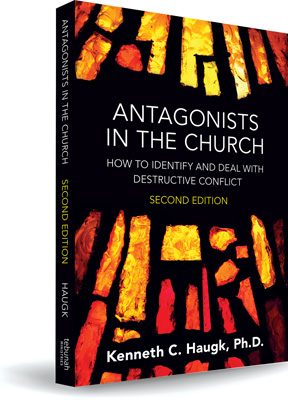“This book really opened my eyes! It showed me that typical conflict management tools and techniques don’t work with antagonists—it takes a totally different approach to deal with them.”
Rev. Lynn Upchurch | Charlotte, North Carolina
“Whatever questions or problems you have in dealing with an antagonist, Antagonists in the Church will give you the answers.”
Rev. Doug MaGinn | Fairfield Glade, Tennessee
“Dr. Haugk broke new ground in the field of conflict by acknowledging the existence of antagonism and giving sage advice on how to counter it. Antagonists in the Church is a lifeline for church leaders.”
Rev. Alston Johnson | Shreveport, Louisiana
“Antagonists in the Church is not only a great how-to book—it’s also a great why-to book.”
Rev. Noni Porter | Sun Lakes, Arizona
“If you ever have an antagonist in your church—and I pray you don’t—this book will tell you what you absolutely need to do.”
Rev. Robert Price | El Dorado Hills, California
“I’ve been doing conflict mediation and transformation work with congregations for most of my ministerial life. With Antagonists in the Church, I’m able to offer churches an established method for handling extreme kinds of conflict.”
Dr. Gordon Myers | Rocky River, Ohio

